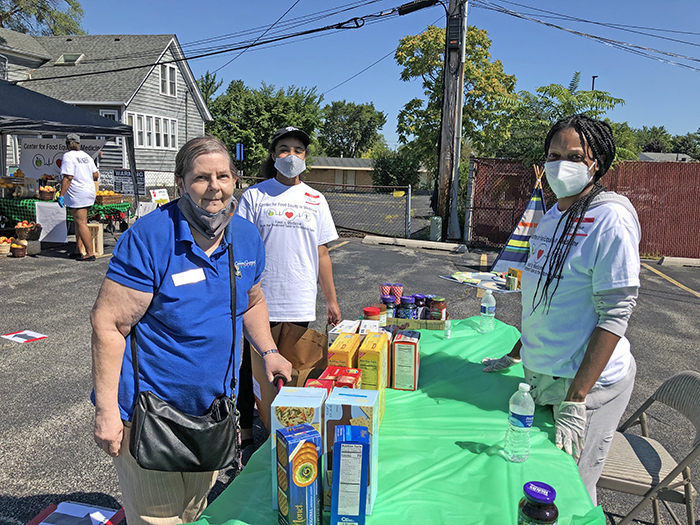When you’re ill, you need to keep your strength up, but Ann Jackson of Flossmoor found some cancer patients didn’t have the resources or energy to get food.
On Wednesday, Aug. 12, she brought a Pop-Up Complementary Nutrition Program to the Cancer Support Center in Homewood. Patients and families who seek care from the center’s staff were invited to participate in the event that included six stations – each with a different type of food.
To meet CDC guidelines, Jackson had the stations set far enough apart, and participants had timed visits so that each guest had their own time to select foods, including fresh fruits and vegetables, grains such as brown rice and quinoa, a selection of canned goods and sides, such as instant breakfast drinks.
Cynthia Turnquest, director of Outreach and Strategic Partners for the Cancer Support Center, said nutrition is one of the major factors for comprehensive care. She deemed the event a success.
“With the pandemic, we found food insecurity comes in a lot of forms now. This was a safe place for them to come,” she said. “We had great synergy. We’re hoping we can keep this going.”
Jackson has been working on food insecurity issues for several years through the University of Chicago, where she was a cancer patient five years ago.
Jackson, a physical therapist by profession, said she always worried about her patients – from all aspects of their lives. Now she found herself doing the same thing during treatment.
“I recognized that some of my fellow cancer patients while I was going through treatment really were struggling to try and meet their needs,” she said. “It seemed like nobody noticed that. That caused me a lot of distress.”
In 2017, Jackson became involved with the University of Chicago Cancer Center advisory council “and we started making changes on the snack cart, we offered meal vouchers, we asked if people wanted more nutritious snacks” during the long hours of treatment.
Jackson was accepted for the Clinical/Medical Ethics Fellowship with the McLean Center at the University of Chicago. Lecturer Dr. Stacy Lindau, talked about how a minister at Comer Children’s Hospital recognized families were eating off of their children’s trays. The hospital put food pantries on every floor of the hospital.
Jackson said the story was inspirational, “and my brain just started working. That’s what I’ve been waiting for,” she remembered saying.
Jackson went back to the advisory council with a suggestion for food pantries.
“We knew there was a need,” she said, so as part of her fellowship she conducted research into patients’ food insecurity and the cancer center conducted patient surveys.
Jackson said today there are six pantries within the UChicago Medicine system, and 60 percent of the activity is at the cancer center.
With help from her friends, Jackson continued to work with cancer patients. In 2019, the center identified seven families in need and they provided Thanksgiving dinner, and several of the families got a Christmas feast and gifts. Jackson uses donations to continue helping families throughout the pandemic. She said the food drop-off saves the family money that they put toward bills and other expenses.
Jackson has several long-term goals. She wants to organize a foundation. The Center for Food Equity in Medicine will work to get healthcare systems to assess patients’ food insecurity needs.
She also wants to “create pathways for them to access and get the nutritional needs from the hospital to their kitchens” through grocery brigades and pop-up nutrition centers like she organized at the Cancer Support Center.
And Jackson hopes to get food insecurity issues into the bigger conversation for patients with chronic health conditions.
Related story:




